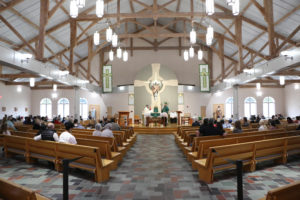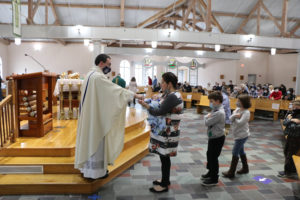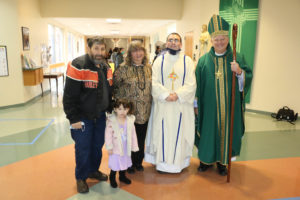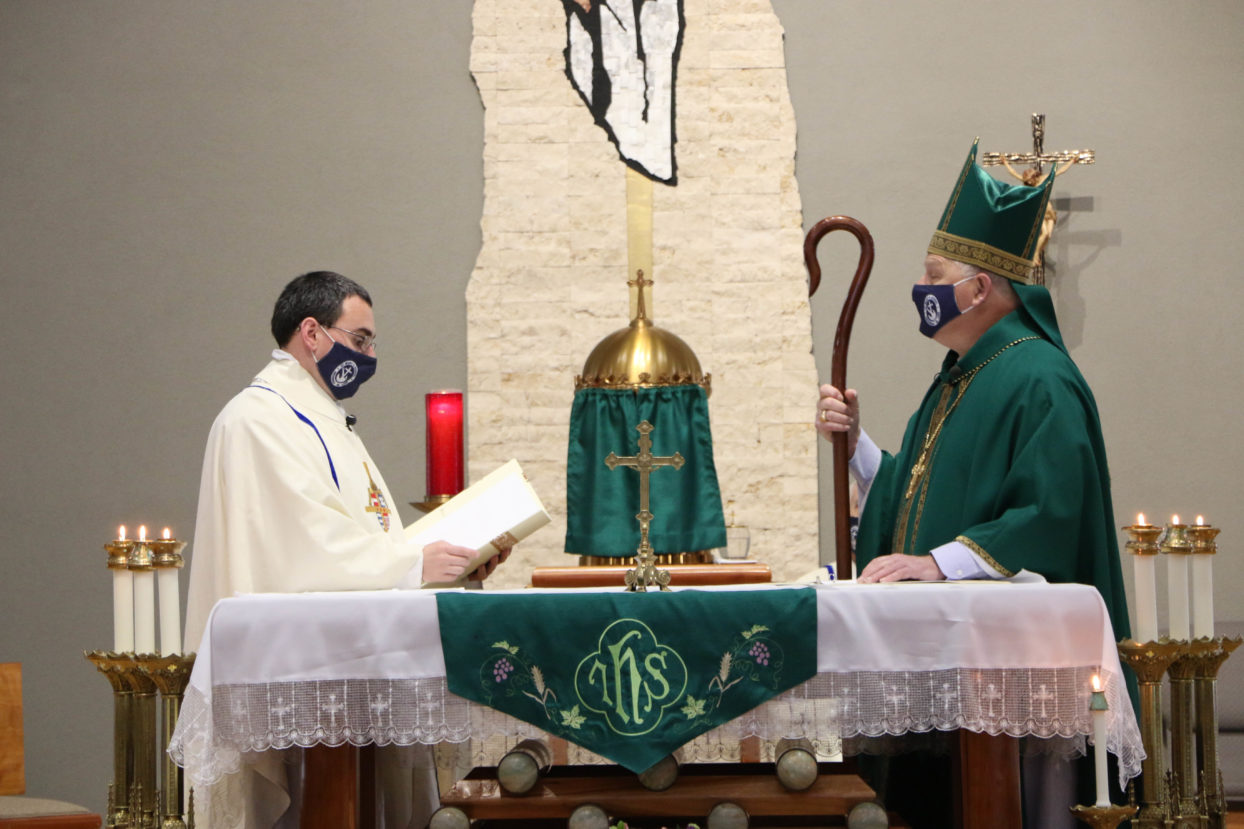Bishop Stika presides as diocesan priest becomes 24th pastor to lead Tri-Cities parish and school
By Bill Brewer
St. Mary Parish in Johnson City has a new pastor. And it’s the same priest who has been leading the parish since July 1, 2019.
Bishop Richard F. Stika installed Father Dustin Collins as St. Mary’s newest pastor on Jan. 17 during a Sunday Mass. Father Collins becomes the 24th pastor of St. Mary since the parish’s founding in 1906.
Father Collins was the 40th priest ordained for the Diocese of Knoxville in June 2012, and since then he has served as an associate pastor at Our Lady of Fatima Parish in Alcoa and St. Mary Parish in Oak Ridge.
In 2019, Bishop Stika named him parochial administrator for St. Mary-Johnson City for an introductory period.

Bishop Richard F. Stika installs Father Dustin Collins as pastor of St. Mary Parish during a Mass on Jan. 17. Father Collins has served as parochial administrator of the Johnson City parish since 2019.
“Today is very historic as I formally install Father Dustin Collins as pastor. Even though he has been here for a while, it is my custom for a brand new pastor to appoint him as administrator for the first year to see how he does. Then, if it’s all good and he hasn’t been kidnapped or tomatoes have not been thrown, we install him formally as pastor,” Bishop Stika said during the Mass.
Bishop Stika delivered his homily prior to installing Father Collins, who was asked a series of questions by the bishop, who then asked the congregation several questions. The Nicene Creed was then said by all just before Father Collins recited the Oath of Fidelity as pastor.
Bishop Stika and Father Collins signed the installation documents, with St. Mary deacons Mike Jacobs and Don Griffith also being signatories as witnesses.
“It’s a very humbling thing to be named the pastor of St. Mary Parish in Johnson City. I just like to go where the Lord calls me to go, through the bishop. He sent me here, so I’m very happy and very humbled to be named the pastor,” Father Collins said.
Father Collins’ parents, Danny and Susan Collins of Notre Dame Parish in Greeneville, and his young niece, Sasha, were in attendance for the installation.
In his homily, Bishop Stika cited communications as a key theme as far back in Scripture as Samuel, who was highlighted in the first reading of Jan. 17, to the present.
“When I was in seminary, one of the things we looked forward to every day was to get mail, which was like contact with the outside world. You didn’t really care where the mail came from. Occupant. Credit card applications. Even if you got somebody else’s mail, you treasured it as long as it wasn’t from the government. Sometimes you even opened it,” he said.
“Nowadays I get a lot of mail. Stacks, plus e-mails and texts. It just piles up every day. I always enjoy getting mail that says Mr. and Mrs. Bishop, to the wife of the bishop, or even homeowner. I get mail from people who have no idea what I do. And then there are other kinds of mail that try to figure out who I am. Did you ever get one of these on your phone? ‘Citizen, your Social Security has been compromised. Please call us immediately.’ Did you ever get one of those? They’re phishing. They’re trying to put your phone number together with your name. I’m still waiting for that Nigerian prince to send me $10 million. Remember that guy? You see, they really don’t know who we are,” he added.
Bishop Stika pointed to Samuel, who wanted to recognize God in something powerful (1 Samuel 3:3-19). But while he slept, Samuel would instead hear a soft whisper.
“He didn’t recognize God because there wasn’t thunder and lightning. Sometimes when I’m channel-hopping I see these evangelical preachers and they’re telling us, ‘Yes, I was sitting in my dining room and all of a sudden I was talking to the Lord. And He was talking to me. I was glad to see Him.’ I’ve been waiting for that moment for a long time,” Bishop Stika said. “A few years ago when I had one of my health situations I was at home for a couple of days. And after I woke up, my brother said, ‘Did you see the light?’ I said, ‘No.’ And he said, ‘Maybe you were going the wrong way.’”
At a time when the United States, and much of the world, is consumed with the coronavirus, politics, social media, and other divisive concerns, the faithful and others run the risk of not hearing God, according to Bishop Stika, who reminded the congregation where God can be heard.

St. Mary faithful receive Communion and blessings from newly installed pastor Father Dustin Collins during Mass on Jan. 17. The Johnson City parish is Father Collins’ first pastorate.
“How do you recognize God in your life? He’s there, isn’t he? I mean that’s why you’re here because there has been some kind of invitation that was extended to you at a very young age, as a baby or maybe more recently, where God has invited you to be in a relationship with Him. It’s real. Again, that’s why we’re here—responding to God,” the bishop said. “A lot of times it’s easy to respond to God. We go to church on Sunday, which is very important. We’re nourished by the Eucharist, which is very important. But there are a lot of times where I think God wishes to engage us in conversation but we would rather say, ‘sorry buddy, I’m too busy.’ Or maybe God is saying to us, ‘hey, I want you to come and follow me.’ But then you turn around and say, ‘that must be that man or woman behind me.’ We’re either too busy or maybe we’re selling ourselves short. We might say to the Lord or have this thought that maybe we can do something but we’re afraid to take that step because we think it’s not us, it’s not me.”
The Apostles continue to be modern-day examples of listening to what God is saying through His Son, Jesus Christ. Bishop Stika described them as unlikely disciples based on their backgrounds and what other people might have said about them. For example, Matthew was a tax collector, among those least thought of in society, when Jesus was selecting his followers. Still, God invites people into a deep relationship with Him, which some discover immediately while others take a long time to hear the invitation. Bishop Stika recounted that as a young man he entered the seminary to prove to himself that he wasn’t meant to be a priest. But in a profound instant, he suddenly came to accept his impending priesthood.
“I’ve had moments when I asked myself, ‘why did I do this? Why did I even say yes?’ But there was a moment when it all made sense,” the bishop shared.
“Right now we’re living in a world that doesn’t really make a whole lot of sense, does it? COVID. Look at what it has done to the world, not just to the United States, not just to Johnson City. Every nook and cranny of the world is dealing with something that we can’t even see. It just shows that mankind isn’t always in charge.
“How about the politics? That’s been a pleasant experience, hasn’t it? I love this quote from Franklin Roosevelt, ‘The only thing to fear is fear itself.’ And I have my own addition to that: the lack of common sense. It seems like the world has a lack of common sense. That is the world in which we live. If we look at the time when Jesus was born in Bethlehem, it was the same way. People were angry with the government. People were pro-Roman and against the Romans, pro-high priests and against the high priests, there was poverty, Caesar Augustus ordered everyone to be counted in a census, Mary and Joseph get to Bethlehem and there is no place to stay. It was just one thing after another thing after another thing. It wasn’t a lot different. But the advantage we have here is we know about Jesus. We have 2,000 years of history in a world that has had some really dark moments. And so has the Church. Yet we’re here,” Bishop Stika said.
“The question is are you open to hear God, to hear His message, like we’re given in the first reading? Are you open, or have you been tainted by COVID or politics, anger or health concerns? Are you listening, or maybe you just can’t hear it. Or are you hearing and you want to look the other way? This is true for all of us,” he added. “Then you might think God is not paying attention to me. I think every time I buy a lottery ticket and I tell Him I’m going to do all of these good things, but I never win. C’mon God, why can’t I win the lottery? So he’s not paying attention to me, right? That’s how we can think sometimes. Or we can negotiate with God. If you give me this, I’ll give you that. But I guess it all comes down to this. Trust. Trust in God. For God so loved the world that He sent His only Son, Jesus, into our world. Jesus bore the sufferings of the world. He witnessed all the cruelty and all the joy and everything in between those. He understands. And we can bring things to Him. We might not always get the answer that we want, but we always get an answer.”
Bishop Stika said he is privileged to be serving in the Diocese of Knoxville and to see the growth and vitality of parishes like St. Mary as he begins his 13th year as bishop in March.

Father Dustin Collins and Bishop Richard F. Stika are shown with Father Collins’ parents, Danny and Susan Collins, and his niece, Sasha, following his installation as pastor of St. Mary in Johnson City on Jan. 17.
“Even in the challenges like COVID, to see the vocations of men and women, growth, capital campaigns, the Bishop’s Appeal, all of these things in which we are making a powerful impact in the world that is mostly not Catholic. Just like Catholic Charities of East Tennessee, which serves 26,000 people, most of them not Catholic. We’re making a difference in our community,” he said.
He ended the Mass by urging the St. Mary congregation to keep the faith amid all the uncertainty in the world. And remember that God has the answer.
“I know there are people who want to wear masks and people who don’t want to wear masks. I got an awful lot of people mad at me because I restricted Communion just to the hand. Recently, Pope Francis made a decision that I was right. … We’re trying the best we can. There are no easy solutions. It is much worse than any flu virus. We don’t know how long this will last. It might be this year, next year. We don’t know how long the vaccines will last. Some people are questioning the morality of the first two vaccines (Pfizer and Moderna). The best moral theologians said they’re morally acceptable, and Pope Benedict and Pope Francis received the Pfizer vaccine. If we make it into a political issue, or an issue that separates us, it just further destroys any sense of community,” the bishop warned.
“One of the biggest decisions I’ve made as a bishop, and for bishops throughout the world, was to close our parishes in March because we didn’t know much about what was going on and what we could do. Now we know what we can do: wear the masks, separation, cleanse our hands. That seems to be the most logical thing. Still, some people are taking issue with that, making it about rights. I would challenge anyone who has issues with that to come up with a better solution,” he said.
Bishop Stika told the congregation he will not lift the dispensation for Mass attendance on Sunday until the COVID pandemic eases.
“This will end in some way. We just have to be patient,” Bishop Stika said. “Please continue to pray for each other and work together. You have a beautiful parish, where you care for each other. Pray for your pastor. He won’t be perfect. Father Collins, pray for your people. They won’t be perfect. If it was perfect, we wouldn’t need a Church. We would be in heaven.”

